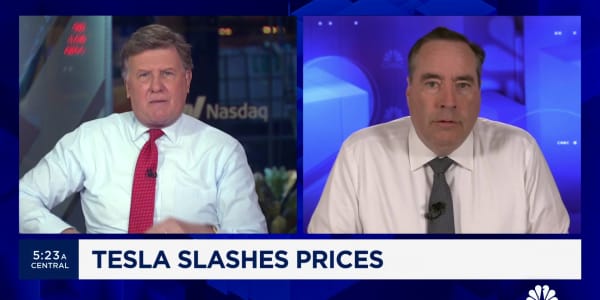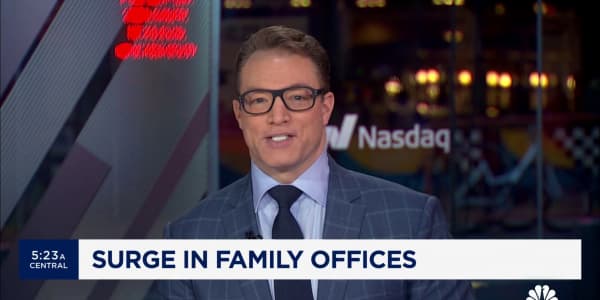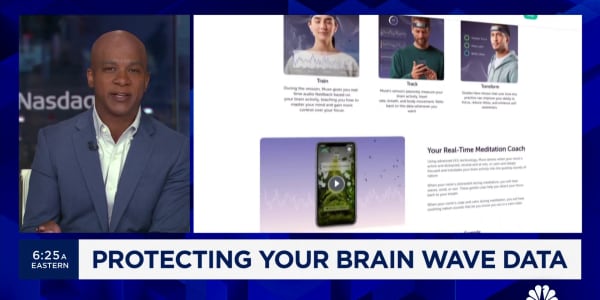Everyone's a winner, right? Maybe just not investors this past week.
While the S&P 500 continues to fire on all cylinders, an economist famed for one thing—asset valuations—warns of a potential stock bubble. And "the smartest guys in the room" have had a pretty lousy five years competing against the market.
A major corporation battling shareholders over yoga pants—no peaceful protest here to make a meditating yogi proud. Investors were bent out of shape over the company's pose, and we aren't stretching the truth!
That and much more, as seen through the lens of CNBC's Executive Edge.
Read on for the list of this week's biggest market winners and losers.
—By Jeff Brown, Special to CNBC.com
Winners: The tax man
Online retailers suffered a setback Monday when the U.S. Supreme Court refused to take up a challenge to state laws requiring Web firms to collect state sales taxes. Amazon.com and Overstock.com had challenged a New York law requiring the tax collections even by firms that have no physical presence in the state. The court's decision not to decide leaves that and similar laws in other states in place. Amazon and Overstock had cited the Constitution's Commerce Clause, which limits the states' authority to regulate interstate commerce. Consumers are required to pay sales tax on online purchases from out-of-state providers, but few do.
Losers: Stock market investors?
Nobel laureate and Yale economist Robert Shiller said this past Monday he's worried that stocks are edging toward bubble territory, thanks to Fed stimulus and speculation. The S&P 500 was up nearly 27 percent this year when Shiller talked to CNBC. Although many experts think stocks can rise more given projected corporate earnings, Shiller worries that the stock gains are out of sync with the weak economy. Another concern is the fast rise in real estate prices in the U.S. and elsewhere. Oh, and what did Shiller win his Nobel in economics for this past October? Work on forecasting asset prices.
Quote:
"I'm not sounding the alarm yet. But in many countries the stock price levels are high, and in many real estate markets prices have risen sharply. ... That could end badly. I find the boom in the U.S. stock market most concerning."—Yale economist Robert Shiller
Winners: Online retailers (and their drones)
So far, the holiday shopping season hasn't been something for retailers to brag about, but if a winner has to be declared, it's Amazon and its delivery drones, or in other words, online shopping over bricks-and-mortar.
National Retail Federation data showed that the average shopper spent $407.02, down from $423.55 at this time last year. Online sales on Cyber Monday, meanwhile, jumped by 16 percent over last year's level. ShopperTrak reported weekend sales were up 1 percent over last year, despite a 4 percent decline in traffic.
This year's especially heavy pre–Black Friday promotions might have moved some holiday shopping up a few days, skewing the data. Some experts worry that the less-than-impressive start shows the Fed's stimulus just isn't working well enough. Ordinary consumers aren't making much progress, undermining things like retail sales, even if stock investors have done well.
Losers: University endowments
The brainiacs at elite universities have just received D's and F's for their sub-par endowment results. In a new five-year ranking of returns, top schools like Harvard, Brown, Cornell, Stanford and Yale all earned less than if they'd had an allocation of 60 percent stocks, 40 percent bonds. Columbia was the only top school to beat that benchmark.
Granted, the institutions may have willingly sacrificed some return to minimize risk, but the results do make one wonder why a university would pay top dollar for investment managers when index funds would do better. Harvard, for example, did the worst of the 12 studied, earning just 1.7 percent a year over the five-year period, trailing the 60/40 portfolio by 4.5 percentage points a year. The head of Harvard's endowment was paid $5.27 million in 2011, the latest year reported.
Quote:
"One common trait among the various endowments is their use of so-called alternative investments like hedge and private equity funds, real estate and more. Those can diversify and help juice returns, but they can come at a high cost in terms of fees paid to third-party managers. In short, they don't always improve returns."—CNBC's Lawrence Delevingne
Winners: The Chinese (again!)
China has found yet another niche in which to beat the U.S.: educating young people. According to a test of 15-year-olds around the world, the best-educated kids are in Shanghai, Singapore and Hong Kong. Americans also trailed many Europeans, including those in Germany, France and the United Kingdom.
Generally, the best school systems provide educational resources to the disadvantaged as well as the advantaged, and they give schools a good measure of control over curricula and student assessments. This set of exams focused on math, reasoning that the rise of computers means more people, not fewer, have to be math literate.
Quote:
"Now that computer technology is accessible to virtually all and is increasingly capable of carrying out routine processes, jobs that do not require mathematical skills are becoming scarcer."—Report of the 2012 Program for International Student Assessment
Losers: Citizens in corrupt countries
The latest report from the anticorruption group Transparency International shows much of the world map in dark red and orange shades denoting deep corruption, including almost all of Africa, most of South America and Asia, except Japan.
Syria, Turkmenistan and Uzbekistan, along with Somalia, Afghanistan and North Korea, are perceived as the most corrupt. Canada, Great Britain, Germany, Japan, Denmark and New Zealand were among those ranked as less corrupt than the United States, which placed 19th on the list of 177 nations. The U.S. was hurt by its poor money-laundering controls, poor campaign finance rules and corrupt government contracting practices.
Winners: U.S. homebuilders
Sales of new single-family homes leaped in October, recording the biggest increase in 33½ years. The Commerce Department said sales jumped 25.4 percent to an annual rate of 444,000 units. Economists had expected 228,000. New-home sales are counted when contracts are signed. The gain came despite a rise in mortgage rates since spring but coincided with a slight dip in rates in October. At October's pace it would take 4.9 months to clear home inventories, down from 6.4 months in September. A six-month supply is considered healthy.
The big question: Will the higher rate of sales hold after today's "preliminary" number is revised? Was the jump an anomaly caused by pent-up demand released when loan rates dipped?
Quote:
"The October 'preliminary' report released this morning, along with the terrible August and September data, is the outlier and will be revised lower next month in line with the new trend lower that began in July."—Housing analyst Mark Hanson, Mark Hanson Advisers
Losers: Lululemon
There are lots of ways for corporate crisis-management teams to gently stretch the truth to their advantage, but Lululemon Athletica played with that phrase of speech in a new way this past week.
The apparel company that makes yoga clothing said this past week about a yoga land skirmish: "We wouldn't have done that because it would have been so, so dumb." The key issue is whether the firm tried to conceal the fact that its yoga pants failed to conceal. Conceal customers' fannies, that is. The fabric stretched when the wearer bent over, becoming transparent.
This made the pants hard to sell, and shareholders have sued for securities fraud, alleging the firm tried to hide this and other problems, such as the fact it was dumping its CEO. The firm insists it announced all important information in a timely way.
Winners: Main Street vs. Wall Street
The European Commission has imposed a record fine on major banks for rigging key interest-rate benchmarks: the European and Yen London interbank-offered rates. The $2.3 billion fine was levied on Citigroup, Deutsche Bank, Royal Bank of Scotland, JPMorgan and Societe Generale.
Quote:
"What is shocking about the Libor and Euribor scandals is not only the manipulation of benchmarks, which is being tackled by financial regulators worldwide, but also the collusion between banks who are supposed to be competing with each other."—EC president Joaquín Almunia
Winner and loser: Bitcoin
A few weeks ago Bitcoin reached a new high when the U.S. government held hearings but decided to hold off doing much of anything about the virtual currency.
Bitcoin's stunning gains came a screeching halt Thursday after the Chinese government gave the crypto-currency a big thumbs down. The currency lost about $200 in value, falling to around $1,000. China barred the country's banks from using it. The government noted bitcoin's price volatility and appeal to criminals and terrorists.
That doesn't mean bitcoin won't test a new high soon enough. A Bank of America analyst said bitcoin could go to $1,300 per coin if three things happen: it is used in 10 percent of business-to-consumer online transactions; it becomes one of the top three methods of transferring money; and it comes to be seen as a wealth-storage commodity, like silver.
Because bitcoin is not issued by a central bank and is not subject to changing monetary policy, it has special appeal to people in countries with volatile, uncertain currencies.
Quotes:
"It's easy for ordinary investors who blindly follow [the currency] to easily suffer heavy losses."—statement by the People's Bank of China
"There's no question that bitcoin has some inherent risk. But I think we also need to recognize the fact that bitcoin does have a role to play in countries where its citizens face high taxes, capital controls or even high confiscation risk. This is why China has seen massive growing demand for bitcoins."—Bank of America analyst David Woo




